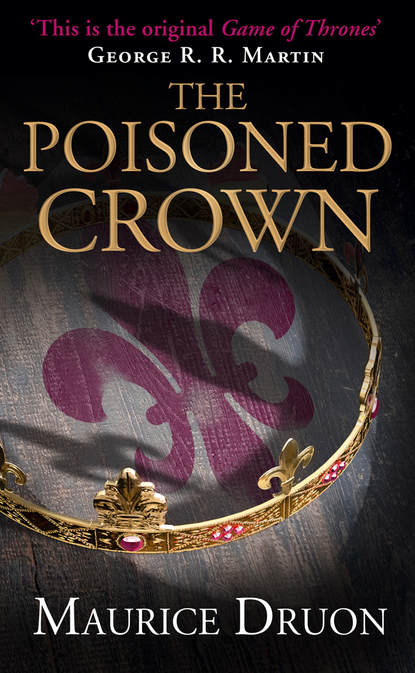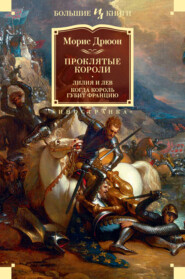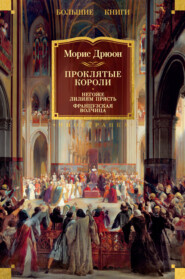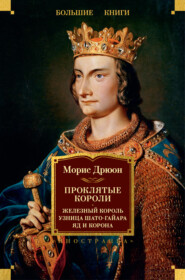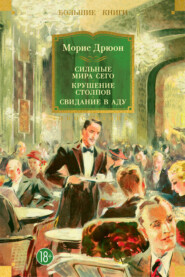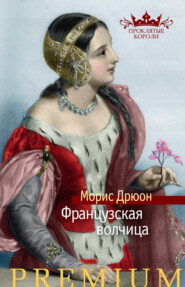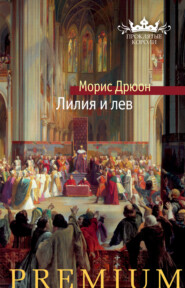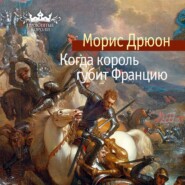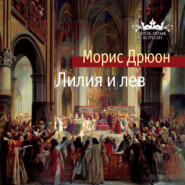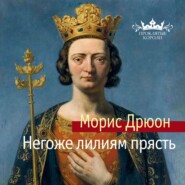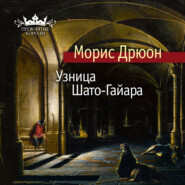По всем вопросам обращайтесь на: info@litportal.ru
(©) 2003-2025.
✖
The Poisoned Crown
Автор
Год написания книги
2019
Настройки чтения
Размер шрифта
Высота строк
Поля
‘Well, Monseigneur, how goes the Conclave?’ he asked.
‘It’s still in the same state, that is to say nothing has supervened. Monseigneur d’Auch, our revered Cardinal Camerlingo, has not succeeded, or does not wish to succeed, for reasons known only to himself, to bring us into assembly. Some of us are at Carpentras, others at Orange, we ourselves are here, and the Caetani are at Vienne.’
Thereupon, he launched into a subtle but, neverthe less, ferocious indictment of Cardinal Francesco Caetani, the nephew of Boniface VIII and his most violent adversary.
‘It is so delightful to watch him display so much courage today in the defence of his uncle’s memory; nevertheless, we are unable to forget that, when your friend Nogaret came to Anagni with his cavalry to besiege Boniface, Monseigneur Francesco abandoned his devoted relation, to whom he owed his hat, and, dressed as a footman, took flight. He seems born to felony as others are to the priesthood,’ said Duèze.
His eyes, alight with senile anger, seemed to shine from the depths of his withered, sunken face. To listen to him, one would have thought that Cardinal Caetani was capable of the most heinous crimes; the devil was clearly in him.
‘And, as you know, Satan may appear anywhere; and surely nothing could be more grateful to him than to establish himself within the College of Cardinals.’
And, what’s more, to speak of the devil at that period was not merely a conversational image; his name was not mentioned lightly, since it might be a prelude to a ban of heresy, to torture and the scaffold.
‘I am well aware,’ Duèze added, ‘that the throne of Saint Peter cannot remain indefinitely vacant, and that this is bad for the whole world. But what can I do? I have offered myself, however little I may desire to accept so heavy a task; I have offered to accept the burden since it appears that agreement can be achieved only upon myself. If God, in selecting me, wishes to raise the least worthy to the highest place, I submit to the will of God. What more can I do, Messire de Bouville?’
After which he presented Princess Clémence with a superb copy, richly illuminated, of his Elixir des Philosophes, a treatise on hermetic philosophy which had considerable renown among the specialists of the subject and of which it was extremely doubtful that the Princess would understand a single word. For Cardinal Duèze, a master of intrigue, possessed a universal mind, was versed in medicine, alchemy, and in all the humane sciences. His works were to stand for another two centuries.
He departed, followed by his prelates, vicars, and pages; he was already living a Pope’s life and would deny, to the limits of his strength, election to anyone else.
When, the following morning, Madame of Hungary’s cavalcade took the road for Valence, the Princess asked Bouville, ‘What did the Cardinal mean yesterday when he spoke of assisting Providence to accomplish our desires?’
‘I don’t know, Madam, I don’t very well remember,’ replied Bouville, embarrassed. ‘I think he was talking of Messire de Marigny, but I didn’t very well understand.’
‘It seemed to me that he was speaking rather of my future husband’s annulment, which was impossible of realization. Of what did Madame Marguerite of Burgundy die?’
‘Of a chill she caught in her prison, and of remorse for her sins without doubt.’
And Bouville blew his nose to conceal his disquiet; he knew only too well the rumours which were current about the sudden death of the King’s first wife and had no wish to speak of them.
Clémence accepted Bouville’s explanation, but it did not set her mind at rest.
‘I owe my future happiness,’ Clémence said to herself, ‘to the death of another.’
She felt herself to be inexplicably allied to this queen whom she was to succeed and whose sins caused her as much horror as the punishment inspired her with pity.
Is not true charity, so rarely felt by those who inculcate it, precisely the emotion which impels the individual, however unreasonably, to identify himself with the crime of the criminal as well as with the responsibility of the judge?
‘Her sins led to her death, and her death to my becoming queen,’ Clémence thought. She saw it as a sort of judgement upon herself and felt that she was surrounded with portents of disaster.
The storm, the accident to the young Lombard, and the rain which was becoming calamitous, were all signs of ill omen.
For the weather grew no better. The villages they passed through had an appearance of desolation. After a winter of famine, the harvest had promised well and the peasants had regained courage; a few days of mistral and terrible storms had shattered their expectations. And now apparently inexhaustible rain was rotting their crops.
The Durance, the Drôme, and the Isère were in flood and the Rhône, along whose banks they were journeying, was dangerously swollen. From time to time they had to stop to free the road of a fallen tree.
For Clémence, the contrast between Campania, where the sky was always blue and the people smiling, the orchards laden with golden fruit, and this ravaged valley, haunted by a wasted populace and depressed villages, half-depopulated by famine, was depressing.
‘And the farther north we go, doubtless the worse it will become. I have come to a hard land.’
She wished to relieve all the misery she saw, and constantly halted her litter to distribute charity to anyone who seemed in need. Bouville was compelled to reason with her.
‘If you give at this rate, Madam, we shall not have enough left to reach Paris.’ It was when she arrived at Vienne, the home of her sister Beatrice, who was married to the ruling Prince of Dauphiné, that she learnt that King Louis X had just left to make war upon the Flemings.
‘Dear Lord,’ she murmured, ‘am I to be widowed before even setting eyes upon my husband? Have I arrived in France merely to witness disaster?’
5 (#ulink_9311d69b-b6fa-524e-9745-ba7e8febd544)
The King Receives the Oriflamme (#ulink_9311d69b-b6fa-524e-9745-ba7e8febd544)
ENGUERRAND DE MARIGNY, during the course of his trial, had been accused by Charles of Valois of having sold himself to the Flemings in negotiating with them a peace treaty which was contrary to the interests of the Kingdom.
And now, when Marigny had but barely been hanged in the chains of Montfaucon, the Count of Flanders had broken the treaty. To do so he had employed the simplest means: he had refused, though summoned, to come to Paris to render homage to the new King. At the same time he ceased to pay the indemnities and reaffirmed his claim to the territories of Lille and Douai.
Upon receiving this news, King Louis X fell into an appalling rage. He was subject to fits of fury which had won for him the nickname of ‘Le Hutin’ and which terrified his entourage, not only for themselves but for him, since at these moments he bordered upon dementia.
His rage, upon hearing of the Flemings’ rebellion, surpassed in violence anything that he had manifested before.
For many hours, as he prowled about his study like a wild beast in a trap, his hair in disorder, his neck empurpled, breaking ornaments, kicking chairs over, he incessantly shouted meaningless words, while his cries were interrupted only by fits of coughing which bent him double, half suffocating him.
‘The indemnity!’ he cried. ‘And the weather! Oh, they’ll pay for the weather too! Gibbets, that’s what I need, gibbets! Who’s refused to pay the indemnity? On his knees! I’ll have the Count of Flanders on his knees! And I’ll put my foot on his head! Bruges? I’ll set fire to it! I’ll burn it down!’
His tirade was a confused mixture of the names of the rebellious towns, the delay of Clémence of Hungary’s arrival and promises of punishment. But the word that came most often to his lips was that of ‘indemnity’. For Louis X had but a few days before decreed the raising of an extra tax to cover the expenses of the previous year’s military campaign.
Without daring to say so openly people were beginning to regret Marigny and his methods of dealing with this form of rebellion; for instance, his reply to the Abbé Simon of Pisa, who informed him that the Flemings were becoming inflamed: ‘Their ardour in no way astonishes me, Brother Simon; it’s the effect of hot blood. Our lords are also hot-headed and in love with war. Yet the Kingdom of France is not to be dismembered by mere words; deeds are necessary.’ People wanted the same tone to be adopted; unfortunately the man who could have spoken thus was no longer of this world.
Encouraged by his uncle Valois, whose bellicose ardour had in no way been diminished by the exercise of power, on the contrary rather, and who never ceased wishing to give proof of his capacity as a great commander, The Hutin began to dream of valour. He would mobilize the greatest army that had ever been seen in France, fall like a mountain eagle on the rebellious Flemings, carve a few thousand of them to pieces, ransom the rest, bring them to their knees in a week and, where Philip the Fair had never completely succeeded, show the whole world what he was capable of. Already he saw himself returning, preceded by triumphant standards, his coffers filled with plunder and with the indemnities imposed upon the towns, having at once surpassed his father’s reputation and effaced the misfortune of his first marriage, for a war at least was necessary to make people forget his marital disaster. Then, amid a popular ovation, he would gallop home, a conquering prince and a hero of war, to meet his new wife and lead her to the altar and to coronation.
Clearly the young man was a fool and one might have pitied him, because there is always something pathetic about folly, if he were not the ruler of France and its population of fifteen millions.
On June 23rd he summoned the Court of Peers, stuttered violently at them, declared the Count of Flanders to be a felon, and resolved to mobilize the army before Courtrai on August 1st.
This concentration-point was not a particularly good choice. It seems that there are places where disaster has a habit of striking, and Courtrai, to people of that period, sounded very much as the name Sedan does to modern ears. Unless it was that Louis X and his Uncle Charles decided presumptuously upon Courtrai precisely so as to exorcize the memory of the disaster of 1302, one of the few battles lost in the reign of Philip the Fair, at which several thousand knights, charging like madmen in the absence of the king, had foundered in the ditches only to get themselves cut to pieces by the knives of the Fleming weavers; a carnage in which no prisoners were taken.
To maintain the formidable army which was to bring him glory, Louis X needed money; Valois, therefore, had recourse to the expediencies which Marigny had previously employed, while people openly wondered whether it had really been necessary to condemn the old Rector of the Kingdom to death merely so as to reapply his methods less efficiently.
Every serf who could pay for his franchise was freed; the Jews were recalled, on payment of a crushing tax for the right to reside and trade; a new levy was raised on the Lombards who, from then on, looked upon the new reign with less favourable eyes. Two urgently demanded contributions within less than a year was rather more than they expected to be subjected to.
The Government wished to tax the clergy; but the latter, arguing that the Holy See was vacant and that no decision could be made without a pope, refused; then, in negotiation, the bishops consented to help provided no precedent were created, and profited by the opportunity to get certain concessions, exonerations, and immunities which ultimately were to cost the Treasury more than the funds obtained.
The mobilization of the army took place without difficulty, and was even conducted with a certain enthusiasm by the barons who, pretty bored at home, were delighted with the idea of donning their breastplates and setting off on an adventure.
There was less enthusiasm among the people.
‘Isn’t it enough,’ they said, ‘that we should be half-starved without having to give our men and our money to the King’s war?’
But the people were assured that every ill derived from the Flemings; the hope of loot and free days of rape and pillage were dangled before the soldiers; for many it was a way of easing the monotony of daily labour and the anxiety of finding enough to eat; no one wished to show himself a coward, and if there were recalcitrants, the sergeants of the King or of the great lords were numerous enough to maintain discipline by decorating the trees bordering the roads with a hanging or two. According to Philip the Fair’s Order in Council, which was still in force, no healthy man could, in theory, be exempted if he were more than eighteen and less than sixty, unless he bought himself out with a money contribution or exercised an indispensable trade.
At that time mobilization was a matter of purely local organization. The knights were sworn men, and it was incumbent upon them to raise a force among their vassals, subjects or serfs. The knight, and even the squire, never went alone to war. They were accompanied by pages, sutlers, and footmen. They owned their own horses and arms and those of their men. The ordinary knight without a banneret held approximately the rank of a lieutenant; once his men were assembled and equipped, he reported to the knight of a superior grade, that is to say his immediate suzerain. The knights with pennons were approximately equivalent to captains, the knights banneret to colonels, and the knights with double banners approximated to generals who commanded the whole tactical force raised from the jurisdiction of their barony or their county.





